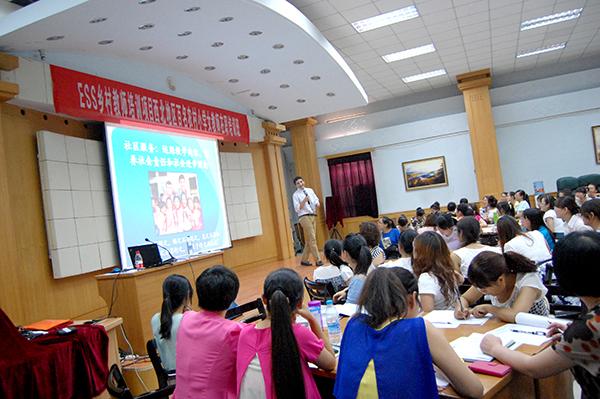GW’s chief academic official is reviving a program that would send undergraduates around the world for up to three years after a former version lost momentum.
Provost Steven Lerman has designed a program for students across majors in the Columbian College of Arts and Sciences that he said could be ready to roll out as early as next fall, and could later be offered in other GW schools. Reintroducing an opportunity for students to study in multiple countries puts the University on track for its plan to strengthen its worldwide presence.
The new option, called the global bachelor’s program, would offer more flexibility than a similar program Lerman decided to shelve about 18 months ago.
It will likely have students spend a year studying in China, as well as two other countries of their choosing across regions such as South America, Europe or the Middle East. Unlike previous plans, it would not be designed for only economics or political science majors.
While the new program will launch within the Columbian College, it could extend to the School of Business, which has graduate programs in China, and other schools, Lerman said. Over time, he said it could even be offered in the School of Engineering and Applied Science, which is known for a heavy set of requirements that makes it more difficult to study abroad.
“If we have the right partners, they could take some of those courses,” he said. “Now I can’t say we’re going to roll that out tomorrow, but the design of it, the way it was designed, I can imagine figuring out how to make it work.”
With the help of the China advisory committee, a group of professors from across schools with expertise in the country, Lerman has spent much of the past year planning the program in addition to other ways GW could partner with Chinese universities.
“This committee gave me advice on it,” he said. “It was presented to the committee, and they loved it. And it’s a concept I think we’re going to be moving forward next year with.”
Lerman’s plan differs from one that former Columbian College dean Peg Barratt pitched two years ago, which would have created a cohort of political science and economics students who would spend two years studying in Foggy Bottom, a year at Renmin University in Beijing and a year at Sciences Po in Paris.
Lerman was one of the administrators to suggest holding off on Barratt’s original plan to give GW more time to plan a recruitment strategy and determine how to share tuition revenue with partner universities. Last winter, he said he wanted to create a program for students to have two study abroad experiences, one in China and another from an approved list of locations.
Ben Vinson, dean of the Columbian College, declined to comment on the program until more details emerge, which University spokesman Kurtis Hiatt said would be by this spring.

Officials have touted the program as a way to attract international students, who might want a more global experience, and it has been an integral part of the University’s plans for international growth.
Undergraduate international students also typically pay full tuition, and luring those students could help GW bring in more to cushion its bottom line and divert to other programs.
Karin Fischer, a senior reporter at the Chronicle of Higher Education who covers the globalization of higher education, said the extra year outside of Foggy Bottom could make it difficult for GW to brand the program as its own.
But requiring students to spend a year in China while offering more choices about where else they can study shows that GW, like many other universities, still recognizes the importance of having a presence in China as it continues to become a global power.
“It would suggest the commitment is there. There’s a lot of space between having an entire campus abroad in China and continuing to be engaged in [the country],” she said.
Under former GW School of Business dean Doug Guthrie, the University had positioned itself to apply for the power to grant degrees in China so it could eventually open a campus there. Guthrie, who was also the vice president for China operations, had introduced China as the key to growing GW’s international presence.
But after he was fired over a year ago, faculty started to push back against that planned growth, and argued that they hadn’t been consulted about how GW should approach international expansion.
Shawn McHale, an associate professor of international affairs who used to direct the Sigur Center for Asian Studies, said stepping back from Guthrie’s plans has allowed administrators to be more deliberative in how they plan to expand abroad.
A study abroad-based program like the global bachelor’s program could prepare graduates to be more competitive for jobs after college, but three years abroad could take away from students’ college experience, he said.
“How do you belong to a Greek organization if you’re around the world? The social aspect may not work out so well,” he said.
McHale said if GW plans to partner with multiple foreign universities, it should reduce the number of institutions where students can study abroad to make sure they attend top-tier schools. Choosing from a short list could help ensure that students have a better experience, he said.
Philip Altbach, director of the Center for International Higher Education at Boston College, said students will need to weigh studying abroad with missing out on the facilities and extracurricular options at GW.
While many universities have created global experiences, Altbach said it’s something that is “hard to do well.”
“If you’re coming to George Washington, you’re coming to George Washington, and you’re in Washington, D.C. and have all the things that offers,” Altbach said. “It’s fine to have a global experience, but the global experience should not be the main thing.”







